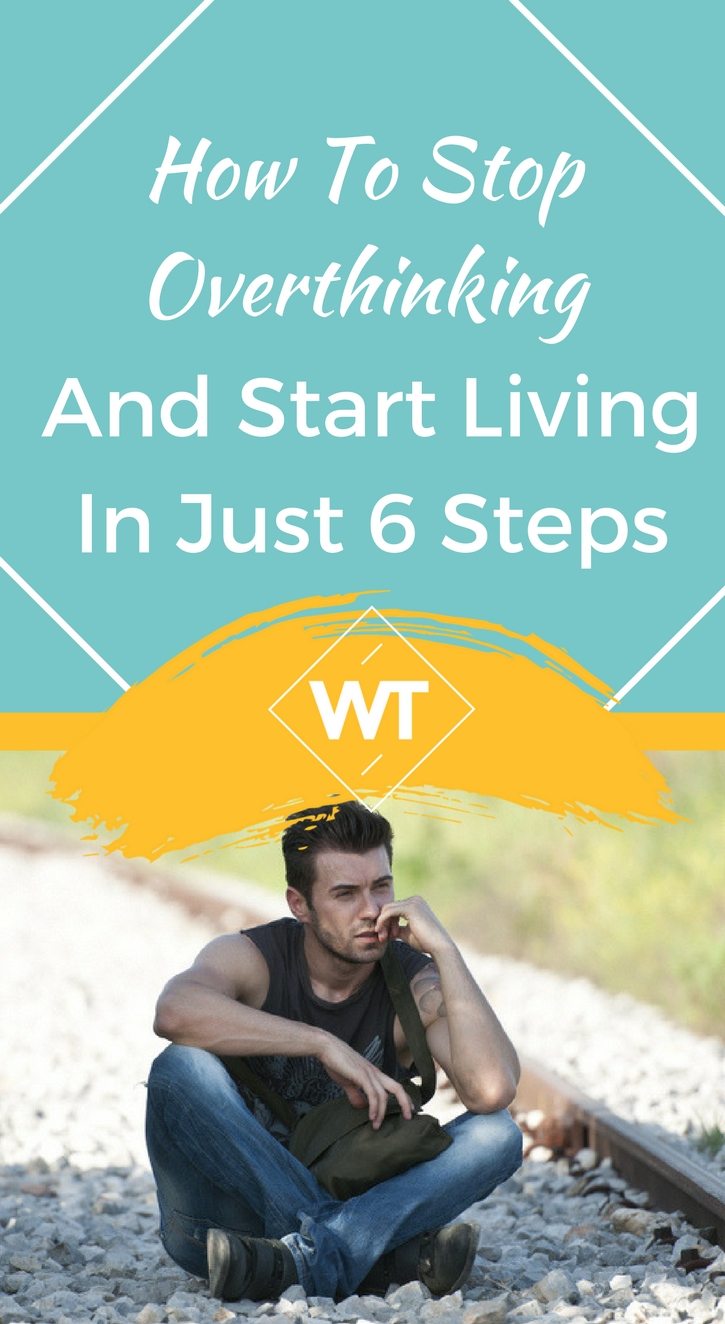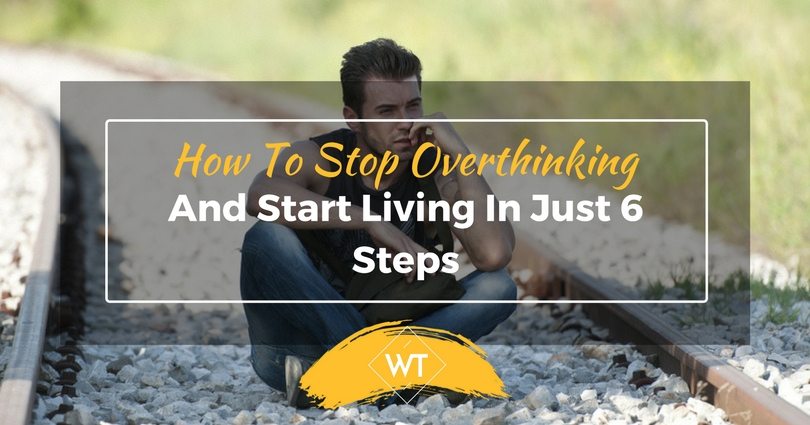How To Stop Overthinking And Start Living In Just 6 Steps

The soul becomes dyed with the color of its thoughts. ~ Marcus Aurelius (Tweet this)
Thinking is one of our natural assets as a species. Its embedded and encoded into our design, both hardware and software if you may. No doubt that it can be a powerful tool when used in the right way and in the right context but the problem lies in that we tend to use it too liberally. In fact any form of thought in us humans is addictive and this is what most of us do not fully realize. It’s no wonder, then, that how to stop overthinking has become the hot topic it has. The mind will naturally latch onto addictive patterns and thinking is one of them. It is a ‘thought junkie.’
Think about it (pun unintended), we think all the time. It’s not just when we want to plan or analyze something but we even think about unnecessary things when not required to by default. If the mind is not occupied with something (which in itself requires thinking), it will think its way into something else.
Even common daydreaming is a form of thought. The funny thing is that we even try to ‘think off’ something meaning we are using our thoughts to get rid of another thought! Hence this becomes the trapping of our own mind and it is what we commonly refer to as ‘overthinking.’
We are addicted to our thoughts. We cannot change anything if we cannot change our thinking. ~ Santosh Kalwar (Tweet this)
How to stop overthinking in 6 steps
Overthinking comes with its own set of problems. For starters, it consumes our energies. Thinking requires a good amount of energy and when we are overusing it, we are consuming even more energy. This is why when someone is overpowered or obsessed by a thought, he or she becomes exhausted, warped and consumed. It makes us shut off from the other areas of our being and eventually our health and wellbeing suffer.
Another big problem with overthinking is that it makes us withdrawn to the outer world. We are less open and aware of the people, situations and energies unfolding around us. It makes us partially blind and hence disconnected with the larger whole. The more we think, the more we isolate or separate ourselves from ourselves and the world at large. This is what we generally mean when we say “he is living inside his head.”
The obvious question then is “how to stop overthinking knowing that it is such a deeply-rooted habit of mind?” There are many ways to overcome this habit, like any other, and some will feel more naturally comfortable or responsive to one method than another. Below I will mention some of the most popular methods that most people seem to resonate with.
1. Being aware of your own thoughts
Since overthinking is a habit or pattern of mind the first path of action for how to stop overthinking is to be aware of it. Many of us spend a lifetime inside habitual patterns of behavior and we keep on perpetuating them for a whole lifetime because we are not even aware or conscious of them.
To get out of any behavioral pattern, we first need to become more aware. Hence, we need to start gradually being more aware when we get carried off by thoughts. At first you might catch yourself once in a while when you are at work, on a bus, or with family, and then you will start becoming more vigilant of your thoughts and how you are using them.
I am not saying that you will end up policing your thoughts all the time (as this is neither practical nor desirable). But it will make an enormous difference and you will definitely notice how you do not succumb to overthinking so often, thus making you lighter, more open and spacious.
2. Meditating
Now of course meditation is a practice that is widely recommended. It seems like “one remedy for a hundred ailments” because it truly is, in fact (and how to stop overthinking is no exception). You must have heard it a hundred times and if you are not already meditating, then perhaps you should hear it another hundred! I will not go into the merits of how to meditate as there are so many resources already on this. What I would like to say however is that one of the most direct benefits of meditating is in fact to recondition the mind to step out of its addictive patterns of behavior, especially with regards to overthinking.
The other thing I always recommend to non-meditators is not to shy away because of the methods or techniques. They are just what they are: methods and techniques. You do not need to sit in a full lotus position for an hour a day (if you know what I mean). You can meditate anywhere and anytime even for 5 minutes a day as long as you learn how to do it properly.
And another thing—there is no real way of showing anyone how to meditate. You will know when you are in meditation.
I remember that I had already been meditating ‘on and off’ for some time before I actually felt what being in meditation is. Contrary to what I had suspected, meditation is not when all thoughts are gone (won’t happen!) but when I felt ‘anchored’ and centered to a point where thoughts still arose but did not sway me into them and they started extinguishing one by one.
3. Learning to properly relax
This is another thing which although suggested a million times over, it is still never overstated. When we over-think, we consume our energies and we ‘shrink’ ourselves. Our bodies become tight and tense. We often don’t realize about the physiology and chemistry of thinking but there is a lot going on in the body if you just listen to it.
So in as much as you can ‘catch’ your mind thinking, you can also be vigilant to signs in your body. It is another point of entry, so to speak. So when you start feeling tense neck and shoulders, or your brow and face are ‘wrinkled’ or you feel tightness in your chest or back, the lights on your dashboard should go on. You then turn your attention to what is going on ‘under the hood.’
Stress or anxiety are natural culprits but these are driven and fuelled by thoughts, precisely called: overthinking.
The counteraction to all this is consciously and deliberately relaxing your body through doing some quick stretching, a brief walk, sitting in a more comfortable position and listening to relaxing music or just unwinding in a hot bath. These and others are all good ways to relax the body. When the body is released, the mind eases too and hence it’s not working overtime through thinking.
4. Maintaining fluidity through breathing
Breathing is part and parcel with the exercise of relaxation but it is so important that I wanted to give it a separate space. The more time pass the more I confirm the importance of proper breathing to our body, mind and spirit. It is so essential to our wellbeing.
When we are tense, anxious, panicky or consumed by overthinking, we automatically go into shallow breathing. This is the only breathing some people do. But this is like having a constriction in your ‘life energy pipe’ and not enough oxygen is filling in your body to energize the cells and all the biological systems. The brain and hence the mind are also main targets.
When we breathe in deeper and longer from your belly, even if for a minute or two, we immediately feel it nourishing our body and brain. You feel energized and your nervous system calms down and strengthens. When we breathe properly, we are nourishing our entire system into balance and hence thinking does not throw us out of balance so easily.
Eventually by being more conscious of our breathing, we also start being more conscious of how it is affected by different processes—thinking being one of them. When you are consumed by a thought, your breathing changes. Conversely, change your breathing and your mind will naturally tend to be less trapped by thinking.
5. The power of letting go
As mentioned above, thinking is an addictive pattern of mind. Now we all know that the hardest part of an addiction is letting go of it. Yet it is the most important part of it all. I have a way of seeing it. I believe that it is hard of letting go of the object of addiction—thinking, smoking, whatever—because we are directly trying to remove that same thing our mind is clinging to.
“Obviously,” you might say. But I think that there is a gentler and healthier way of getting rid of any addiction and that is by getting used to the idea of letting go in general—as a way of life.
To be short and abrupt, if you really practice letting go of some of your most fundamental beliefs and world views, you are open to let go of so many other things. It becomes easier, and so will letting go of your addiction to overthinking.
Am I suggesting that the answer to how to stop overthinking is to practice letting go of other things in your life? Sort of.
In a way, if you practice letting go as a practice (one perfect idea is to simplify your life), you start shaping yourself in a way that nothing ‘sticks’ on you anymore. You become more conscious and intuitive of your own internal signs. In other words, you start mastering your thinking, mind and your life in general.
6. Assuming responsibility for our own inner world
One last point I felt relevant to include is the idea about assuming responsibility for your own thinking as I believe this point is not very frequently discussed except in some circles. The idea starts from the notion that thought is ultimately energy as is everything else.
When we think we are using, moving, blocking or emitting energies. Whatever the case we are working with energy which can affect other systems working with energy such as the biological systems in our body and those of others.
In holistic practices such as energy medicine, this view of thought being energy is a fundamental notion. What’s more important is how certain thought patterns—for example, negative thoughts—energetically affect other systems related to our own and others’ health. This is not obvious to us because it is not visible but it doesn’t mean it is not there.
Final Thoughts
When we think, we are doing much more than ‘thinking.’ We are also putting forces to work. Hence, the idea is to be more responsible for our thinking and how it can affect or ‘pollute’ our immediate environment. This conscious attitude is also directly linked with the idea of overthinking since this is one of the first things that ‘responsible thinkers’ watch out for.
So where can you go from here? Nature, as they say, abhors a vacuum. Now that you have cleared out the mind space (because you know how to stop overthinking), you might wonder what to fill your mind with next. Well . . . maybe nothing. Try this one on for size. It’s an article about how to simplify life and find your true purpose.
Thoughts are as the sands of the seashore—infinite. ~ Edward Counsel (Tweet this)









Leave a Reply